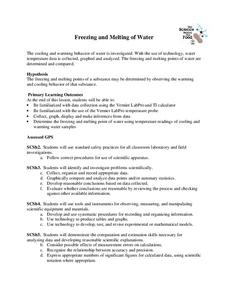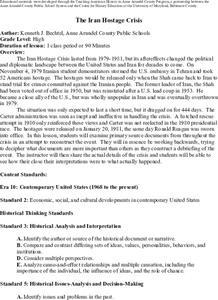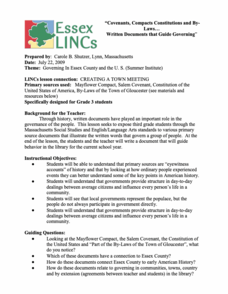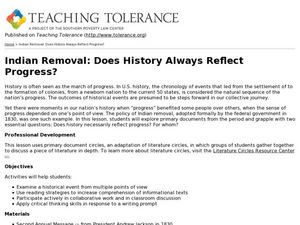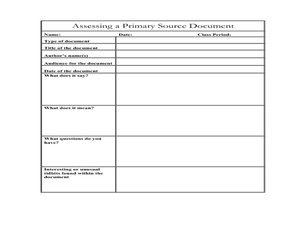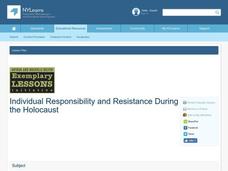University of Georgia
Freezing and Melting of Water
Examine the behavior of energy as water freezes and melts. An engaging activity provides a hands-on experience to learners. Collaborative groups collect data and analyze the graphs of the temperature of water as it freezes and then...
National WWII Museum
“My Dear Little Boys…” Interpreting a letter home from the war
Letters have long been prized by historians as primary sources for what they reveal not only about events but also about the emotional responses of the writers to these events. "My Dear Little Boys," a letter written by Leonard Isacks on...
US National Archives
WWII: Western Europe 1939-45 – Deception and Bluff
World War II left the British desperate for help in any form—including in the form of a magician! High schooler conduct research on Jasper Maskelyne, a stage magician who used his talents to deceive the Germans on the war front, before...
Echoes & Reflections
Antisemitism
Propaganda and anti-semitism were linked to evil ends during the Holocaust. Using video testimony of Holocaust survivors, examples of Nazi propaganda, and discussion questions, learners explore the roots of anti-semitism in Europe and...
National Endowment for the Humanities
How "Grand" and "Allied" Was the Grand Alliance?
Learn more about the Grand Alliance with a scaffolded lesson plan that includes four activities. Class members use primary sources to complete a map exercise, understand the goals and objectives of each individual nation, and participate...
K20 Learn
American Exclusivity: The Chinese Exclusion Act
The Chinese Exclusion Act—the first race-based immigration restriction—is echoed in today's debates on the topic. Using graphic organizers and structured discussions, historians consider the reasons behind the act and compare the...
Stanford University
Sourcing
What questions do historians ask when sourcing a document? Here's a poster that models these questions.
Library of Congress
The Conservation Movement at a Crossroads: The Hetch Hetchy Controversy
Should wilderness areas be preserved or managed? Class members examine primary source documents, including lecture notes, articles, essays and congressional records to better understand the Hetch Hetchy controversy that created a split...
PBS
March on Washington: A Time for Change
Young historians conclude their study of the events that lead up to and the planning for the March on Washington. After examining videos and primary source documents, they consider the civil rights objectives that still need to be...
Center for History Education
The Iran Hostage Crisis
While the Iranian Hostage Crisis was a watershed moment, few history classes take on the complex series of events leading up to it. Using declassified documents, including a hostage's diary, young historians create their own reports to...
Curated OER
D-day Message from General Eisenhower to General Marshall
Students analyze a "top secret" document written by Eisenhower. They identify and chart cliches for those about to go into battle and read related poetry. They invite a veteran to describe the D-Day invasion.
Curated OER
Covenants, Compacts, Constitutions and By-Laws... Written Documents that Guide Governing
Third graders discuss documents in our government. In this government lesson, 3rd graders look up vocabulary words and illustrate them. They examine a historical document to discuss and answer questions.
Curated OER
Indian Removal: Does History Always Reflect progress?
Learners explore the idea that progress for some might not mean progress for all. In this Native American lesson, students recognize different viewpoints about historical events through the study of primary documents. Learners decipher...
Curated OER
Lines From Behind the Lines
Fifth graders create a timeline of events in a soldiers life. In this World War I lesson, 5th graders learn about the Great Depression and World War I. Students watch video segments about World War I and examine primary...
Curated OER
Discover the Real Depression
Eleventh graders take a closer look at living conditions during the Great Depression. In this Great Depression lesson, 11th graders analyze primary source packets that their teachers prepare and then record facts about life...
Curated OER
Conflict and Compromise
Learners examine opinions about the Boston Tea Party. In this colonial America activity, students analyze several primary sources about the Tea Party and then write essays that reveal efforts to compromise as well as efforts to instigate...
Curated OER
What is to Become of the World After the War?
Learners analyze primary sources regarding World War II. In this World War II lesson, students read "The Atlantic Charter," and respond to questions about the document.
Curated OER
Geography and Its Impact on Colonial Life
Learners interpret historical evidence presented in primary and secondary resources. In this colonial America instructional activity, students conduct research to determine how geographic conditions dictated...
Curated OER
The People of Kansas: Who Are They and Why Are They Here?
Students examine the settlement patterns of the Kansas Territory. In this Kansas history lesson, students analyze primary documents from the pioneers in the territory. Students write letters or perform skits that feature their findings.
Curated OER
Leaving Home for the West - Why?
Students examine primary sources regarding American movement to the west. In this westward expansion lesson, students create broadside posters based on the Homestead Act primary sources they research.
National History Day
“War Is Hell. We Know it Now.” American Soldiers in the Meuse-Argonne Offensive
Understanding the soldier's experiences during World War I sometimes takes a newscast. Learners see the importance of understanding multiple points of view with a newscast project surrounding the Meuse-Argonne Offensive. Compare and...
Curated OER
Understanding Points of View
Investigate the importance of author's point of view. Young linguists study primary source documents related to the Treaty of Casco Bay. The first source is authored by the Native American Chiefs, the second by an English...
Curated OER
Individual Responsibility and Resistance During the Holocaust
Students examine what obstacles hinder resistance, what types of resistance are possible and how different individuals resisted Nazi oppression. They examine primary source documents related to the Holocaust and analyze various sources...
Curated OER
Socratic Seminar on Martin Luther King, Jr.’s Letter From Birmingham Jail
Key in the struggle to gain the rights of democratic citizenship was the April 1963 arrest of Dr. Martin Luther King, Jr. for civil disobedience. To deepen their knowledge and understanding of events during the civil rights movement,...
